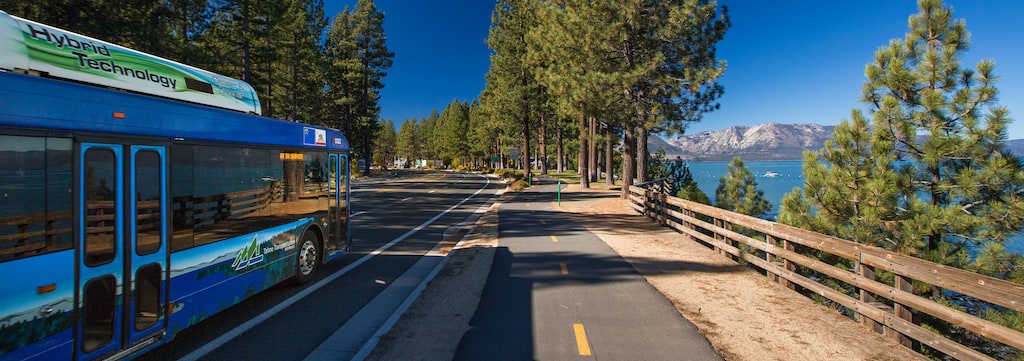
Category: Transit
Vanpools Available for North Lake Tahoe Employees Based in Reno or Carson City
 Vanpools Available for North Lake Tahoe Employees Based in Reno or Carson City Employers in Kings Beach and Tahoe City, do you have employees commuting from Reno or Carson City? Truckee North Tahoe TMA, Commute with Enterprise and Mountaineer Transit partner to provide vanpool options in Eastern Placer County. This partnership supports Truckee North Tahoe TMA’s commitment to innovative and sustainable shared mobility options for residents and employees who commute in or out of Eastern Placer County.  TMA is looking to put together vanpools of employees working shifts from Monday to Friday between the business hours of 9:00 a.m.- 5:00 p.m. The goal is to get a vanpool going by the beginning of May. Interested employers should reach out to Sara at sara@tnttma.com. 12 Vanpools Currently Running in North Lake Tahoe The North Lake Tahoe Workforce Vanpool began with ten vanpools in December 2023, and there are currently 12 vanpools running. Funds are available for up to 20 vanpools, which includes a goal of three vanpools for employees from small businesses in the region. Participating employers include Palisades Tahoe, Granite Peak Management, Tahoe Truckee Sierra Disposal and Everline Resort and Spa. In the first three months, the program eliminated 6,213 vehicle trips and saved 231,350 vehicle miles traveled, 9,109 gallons of fuel, and 176,308 pounds of carbon dioxide.  About the Program This program reduces the cost of vanpools for businesses and individual riders and increases the vanpool subsidy available to commuters through the existing Regional Transportation Commission of Washoe County Smart Trips program. The program helps address regional transportation needs while helping preserve the local natural environment by reducing greenhouse gas emissions and traffic congestion. Vanpool vehicles are provided through Commute with Enterprise. All commuter vans include 24/7 insurance coverage, 24/7 emergency roadside assistance, customer service support, maintenance, fuel card, and downtime credit. All-wheel drive vehicles are available through the program. A guaranteed ride home program is also provided through the Washoe RTC Smart Trips program, allowing participants to receive reimbursement if they have an emergency during the work day and must find alternative transportation home.  The North Tahoe Community Alliance is proud to contribute to funding of the North Lake Tahoe Workforce Vanpool through the TOT-TBID Dollars At Work Program.  |
| North Tahoe Chamber | 100 North Lake Blvd., PO Box 5459, Tahoe City, CA 96145 |
Tahoe Transportation District receives SMART grant for traffic data collection
New traffic counts will support regional transportation planning
March 20, 2024
Tahoe Transportation District (TTD) received a Strengthening Mobility and Revolutionizing Transportation (SMART) grant from the US Department of Transportation (USDOT) to plan for and evaluate multimodal traffic data collection technologies. This will allow the region to better understand the number of vehicles entering and leaving the Lake Tahoe Basin as well as other transportation needs to help manage traffic operations and safety concerns.
Types of Projects supported by the USDOT SMART Grant program
Source: USDOT, SMART Grants Program | US Department of Transportation
FAQs
Who is involved?
TTD, along with the Tahoe Regional Planning Agency (TRPA), US Department of Transportation, Nevada Department of Transportation (NDOT), California Department of Transportation (Caltrans), US Forest Service, and local governments in the Tahoe region, are collaborating to identify the most suitable locations for this traffic data collection pilot program.

What is the SMART grant program?
The Bipartisan Infrastructure Law (BIL) created the competitive SMART grant program to provide funding to public agencies to conduct demonstration projects focused on advanced smart community technologies that improve transportation efficiency and safety. The TTD grant will test data collection technologies in the Lake Tahoe Basin, which has unique challenges related to climate and availability of utilities for traditional data collection methods.

How long will the project last?
SMART grants are intended to be completed within 18 months. The project is currently in the planning stage and data collection is expected to begin during the summer of 2024.
Where and how will data be collected?
TTD, TRPA, and other partner agencies are currently working to identify the most suitable technology and locations for traffic data collection. Priority locations may include entry points into the Lake Tahoe Basin and high-traffic areas across the region. Information that could be used to identify individuals, such as license plates, will NOT be collected.
Why is this project needed?
The Lake Tahoe Region has unique travel patterns due to a combination of local residential and commercial trips plus visitation from around the region and the world. However, there is limited information about exactly how many vehicles are travelling around the region and how this varies by season, holiday periods, time of day, and specific location. Information about how many people walk, bicycle, or use other ways to travel is also limited. Once developed through this grant program, transportation planners will use this data to better understand and prepare for transportation needs.
How will the data be used?
TTD and TRPA will use the data to gain a better understanding of traffic movement into and through the Lake Tahoe Basin by season and time of day. This information will be used to identify transportation needs and potential solutions to meet the unique travel demands of the region. Information will be made available to the public though TRPA’s Tahoe Open Data web portal.

Route 50 service extended during select Tahoe Blue Event Center events
Tahoe Transportation District is pleased to announce the extension of route 50 to accommodate select Tahoe Blue Event Center events throughout 2024.
TTD will operate the Route 50 Express, serving ONLY the stops listed below. The route will extend to the Kingsbury Transit Center (parking garage adjacent to Kahle Dr. on eastbound Highway 50). The final departure is planned for 9:30 pm from the Tahoe Blue Event Center.
Route 50 Express will serve all stops listed below. Those displaying times are timed stop locations. For stops displaying the “~” symbol, please defer to the time designated at the timed stop location listed immediately before.
Buses will stop on US 50 directly in front of the Tahoe Blue Event Center at the designated bus stop. If you’re planning on attending a event, be sure to take advantage of the expanded FREE service on:
April 4: Nate Bargatze
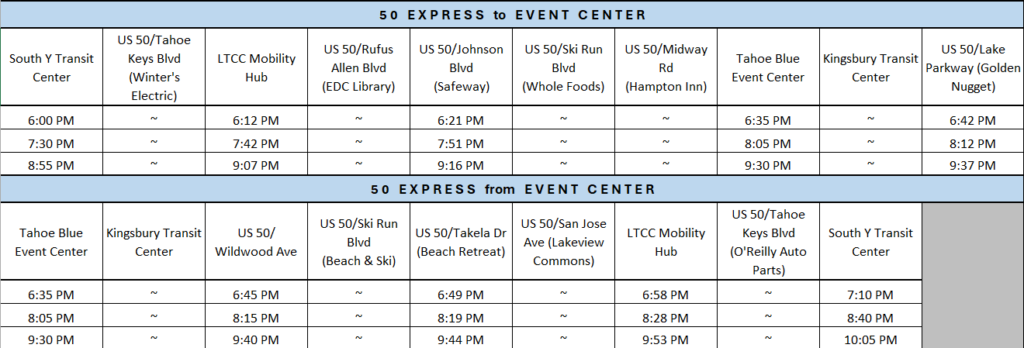
For up-to-date information, download the transit app:
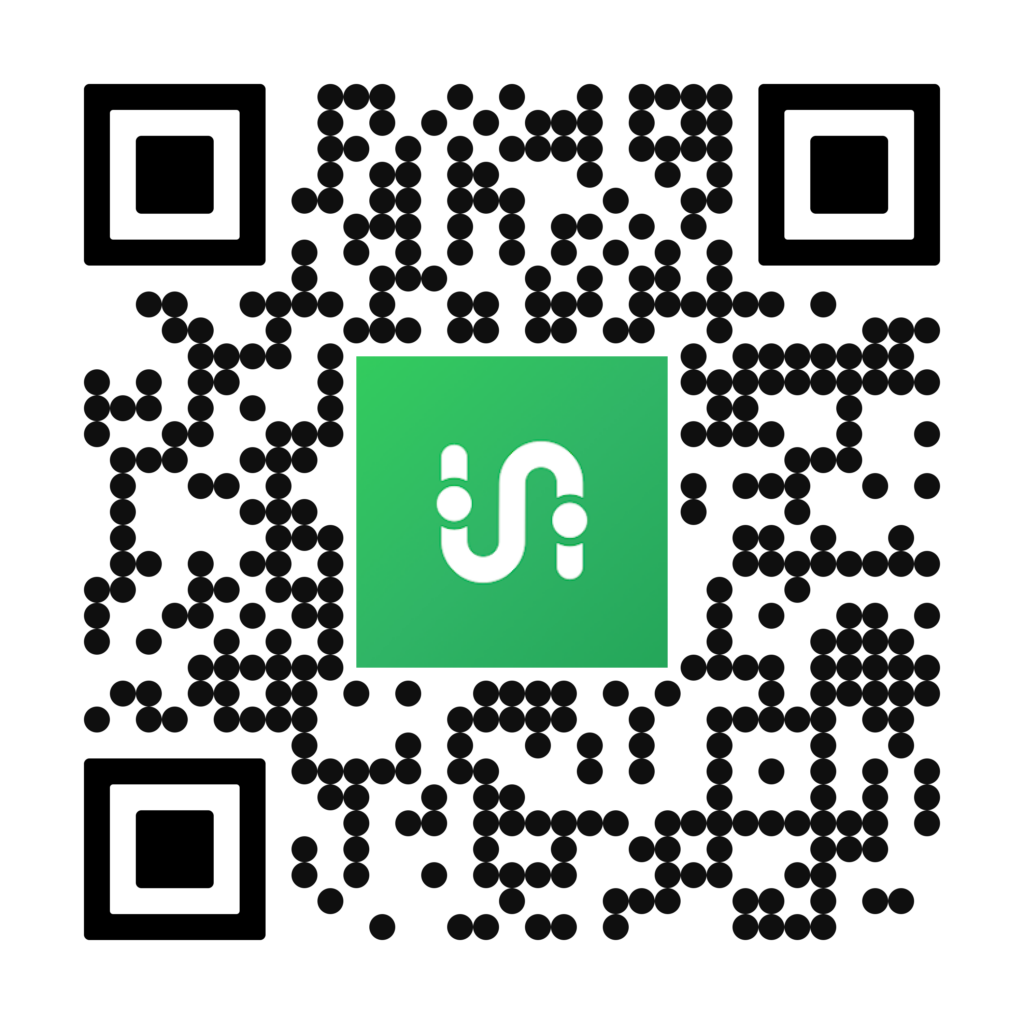
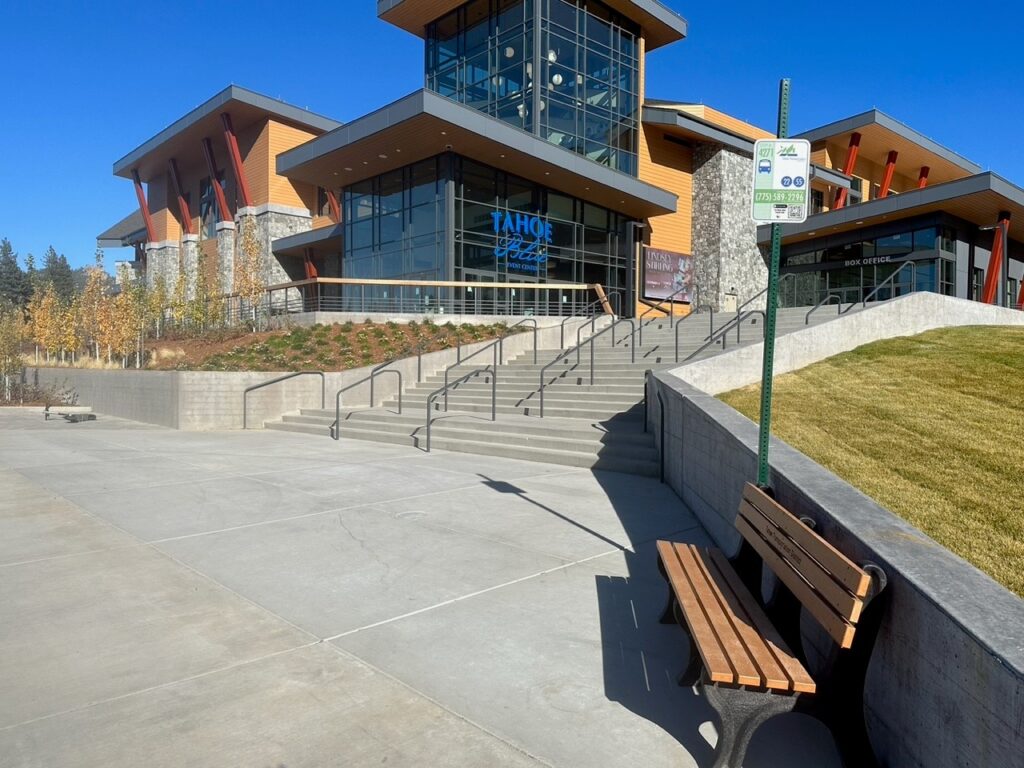
Service Alert: Storm may Impact Operations Feb. 29-March 3, 2024
According to the latest forecast, the Lake Tahoe region is expected to experience a storm from Thursday through Sunday. This storm may bring heavy snowfall and potentially cause transportation disruptions.
If you’re planning to travel during this time, planning ahead is important. We recommend downloading the Transit App for real-time updates on route changes or delays. You can also contact dispatch at 530-541-7149 for further assistance.
For more information, please visit www.tahoetransportation.org.
In the meantime, please take all necessary precautions and stay safe.

East Shore Trail closed for maintenance starting September 29th
The East Shore Trail will be closed for approximately 4 days starting September 29th due to a slurry seal on the entire 3-mile length of the trail. During this time, there will be no access to the trail. We appreciate your cooperation and understanding during this maintenance period.
Lake Tahoe’s First Electric Transit Bus Fleet Marks First Year of Service
Lake Tahoe’s First Electric Transit Bus Fleet Marks First Year of Service
Receives FTA Grant for $3.4 Million to expand fleet with four new hybrid buses
July 12, 2023, South Lake Tahoe, Calif. — Partners in the Lake Tahoe Basin’s first electric charger mobility hub gathered at Lake Tahoe Community College today to mark a historic year of service for the area’s first zero-emission electric transit bus fleet and collect a check from the Federal Transit Administration. Tahoe Transportation District (TTD) won a competitive federal grant process and is receiving $3.4 million to expand the area’s clean transit fleet with four new hybrid buses. The grant is funded by the Bipartisan Infrastructure Law.
TTD’s Clean Transit Initiative is focused on improving fleet reliability, reducing greenhouse gas emissions in the Lake Tahoe Basin, providing a clean and quiet solution for neighborhood transit, and reducing operating costs while helping TTD meet the standards of the California Air Resources Board’s Innovative Clean Transit Rule years before it is required.
The Lake Tahoe Community College (LTCC) Mobility Hub project includes two 450-kilowatt overhead, fast chargers to accommodate on-route charging of electric buses along with a 60-watt pedestal charger for the overnight charging of the electric buses. The facility also features passenger amenities including heated ADA-accessible sidewalks, bicycle storage and maintenance station, and passenger notification screens. The project was developed through a strategic partnership with TTD, LTCC, and Liberty Utilities.
In one year of service, the zero-emission electric buses have run a total of 66,861 miles saving an estimated 13,372 gallons of diesel fuel resulting in the elimination of 136.11 metric tons of CO2 from the environment.
During the ceremony, TTD officials did a live demonstration of noise pollution reduction in neighborhoods with the use of electric transit. Using a handheld decibel meter, the diesel bus idle noise levels hit 80 decibels. The electric bus registered at 50 decibels.
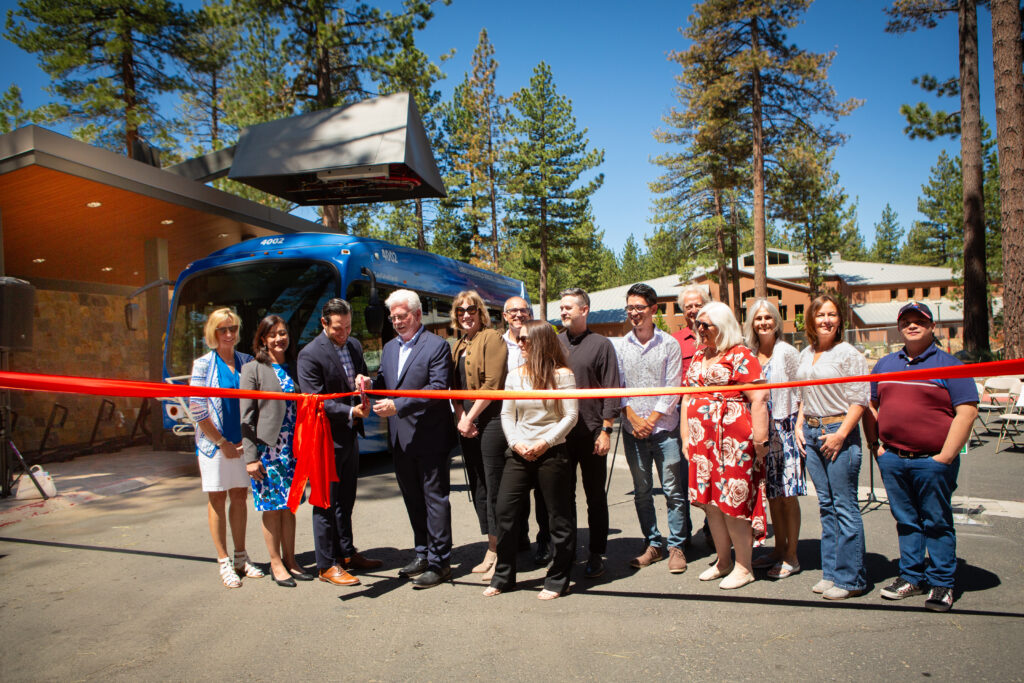
TTD’s Disadvantaged Business Enterprise Participation Goal is posted
TTD is proposing a 4.8% goal for Disadvantaged Business Enterprise participation for Federal Fiscal Years 2024 – 2026. Click here for more information.
Face Coverings Required on Transit Starting May 18
Beginning Monday, May 18, 2020, Tahoe Transportation District (TTD) will require all passengers to wear a face covering on transit buses and in transit facilities to help slow the spread of COVID-19. This requirement is consistent with the Centers for Disease Control (CDC) recommendations to wear face coverings in public settings where other social distancing measures are difficult to maintain.
The required face coverings must cover the passenger’s nose and mouth, as recommended by current CDC guidance to help slow the spread of COVID-19 in areas of significant community-based transmission. Face coverings are not surgical masks or N-95 respirators, which are critical supplies for
healthcare workers and first responders during this pandemic. Please note that transit operators will make periodic announcements to remind passengers about this policy, and Required Face Covering notices will
be posted at TTD transit facilities. “TTD is continuing to monitor Nevada and California state guidance to implement the most rigorous standards to ensure the safety of transit operators and the community,” said Carl Hasty, district manager of the Tahoe Transportation District. “Face coverings, fare-free service, and enhanced cleaning and disinfection practices are among a number of heightened safety measures TTD has implemented to make
our transit system as safe as possible while ensuring mobility and access for essential workers and services during this public health crisis.”
Face coverings are an additional safety precaution and not a replacement for the CDC’s social distancing guidelines. TTD asks the community to continue maintaining 6-feet social distancing between transit operators and passengers, and please observe the buffer zone of empty seats around transit operators. Transit operators and TTD staff assigned to serve the public will continue to wear face coverings, as is required by the Nevada State Occupational Safety and Health Administration (NV OSHA).
TTD continues to monitor and implement the latest recommendations from local, state, and federal health officials, including CDC guidelines for transit operators. These include: social distancing, back door entry/exiting, enhanced cleaning and disinfection, and use of alcohol-based hand sanitizer, which is available on all buses and in transit centers. TTD also introduced a fare-free program to eliminate fare exchanges, which helps minimize risks by enabling passengers and operators to follow social distancing guidelines. Other policies TTD has implemented to combat COVID-19 include: daily and nightly sanitizing of bus contact surfaces; use of gloves and face coverings; contingency planning for transit services and operations; daily communications with local health and emergency services officials; virtual meetings; and remote work, for employees who can do so.
The CDC offers the following guidance on how to wear a face covering.
Face coverings should:
- Fit snugly but comfortably against the side of the face
- Be secured with ties or ear loops
- Include multiple layers of fabric
- Allow for breathing without restriction
- Be able to be laundered and machine dried without damage or change to the shape
The CDC further advises that face coverings should not be placed on young children under the age of two, anyone who has trouble breathing, or anyone who is unconscious, incapacitated, or otherwise unable to remove the face covering without assistance. For more information on these guidelines, please visit: https://www.cdc.gov/coronavirus/2019-ncov/prevent-getting-sick/diy-cloth-face-coverings.html.
For information on CDC COVID-19 recommendations to protect yourself and others, see: https://www.cdc.gov/coronavirus/2019-ncov/prevent-getting-sick/prevention.html.
For
